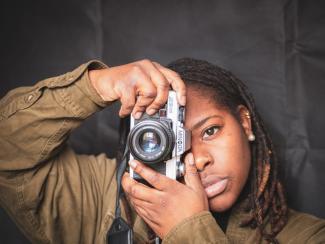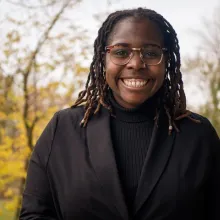Through My Lens—The Master Liberator

I often think about the gospel and how it was presented to me. It was in the country roads of southern Arkansas, where my grandmother sang in the choir of a Black church. It was the hands raised, the strength of the Black women, and the rapping of the pastor that excited my soul. It always struck me that pain, joy, and hope could coexist.
Why are they crying? Why are they clapping? And who is listening? These were the questions that loomed in my young mind and were sometimes expressed verbally (those questions were more than likely greeted with a stern look to be quiet). I had no idea I was experiencing the Master Liberator tending the wounds of his people. This was the gospel.
Why are we crying?
Although I was raised in the Bible Belt, I can’t say I knew this message of liberation and life. But when I felt the embrace of the Creator in my college dorm room during the fall of 2011, I was reminded of those Sundays my grandmother dragged my brother and me to church in Arkansas.
I learned we cry because we are waiting. We cry because the body aches from self-destruction. We cry because we are the ones on the temple outskirts waiting for liberation to meet us.
That memory of the church gave me hope. The hope that carried me when police shot and killed my friend a few days before Christmas two years ago. The hope that carries me when Black girls are only seen as property. The hope that carries me when I see the mighty strike of poverty. The hope that carries me today. How can you long for liberation for so long and wait? This is the question that now looms in my mind as an adult Black woman. I am simply being carried by the same promises and truths that were housed in that church in Arkansas.
The gospel message is not an addition to my longing for liberation; it is at the center. To the Black man and woman, the gospel is longing, waiting, remaining, and petitioning for the Lord to address the wounds of his people. I confess that this gospel is not entirely easy to live, but I have experienced the Lord for myself. I’ve been reminded time and time again where he has addressed the wounds of the sick and blind, the powerless and afflicted. This is the same Lord.
Why are we clapping?
We clap because we have access to an eternal joy. We clap because hope in the Lord is deeper than the present. We clap because there is one who reached down and addressed us as a son or daughter. We clap because we know the Master sees us and is liberating us.
This hope is what carries me into mission on campus, looking to embrace the sons and daughters who are often overlooked. I look to this hope when I see students being shut out on campus and afflicted with mental illness, family pains, and unmet expectations. I want them to cling to the hope of the gospel. The liberating gospel reaches them too.
Who is listening?
We know the Lord is listening. On bended knee, he is listening. He is tending to the wounds of his people. He is shifting systems set out to crush his creation. He is clapping with us. He too is afflicted with the pain of one-sided systems. He sees us. If this wasn’t the true image of God, the pain would have choked us out, and hope would have never met us.
“You will go out in joy and be led forth in peace; the mountains and hills will burst into song before you, and all the trees of the field will clap their hands” (Isaiah 55:12). I imagine this is what my ancestors wrestled with, the coexistence of joy, pain, and hope. It is here where I am met with the raw nature and love of Jesus, the Master Liberator. A God who knows the pain.
So my response is just like the ones I saw as a child in the country church in East Arkansas. This is the gospel to me as a Black woman.







